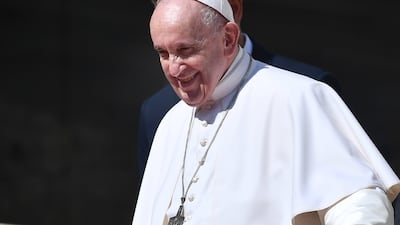Pope Francis has described the Covid-19 pandemic as the “great test of our time” as he warned against selfishness in recovery efforts.
The head of the Catholic Church also warned of the “lurking” threat of anti-Semitism around the world, before he meets members of Slovakia's Jewish community for talks.
The 84 year old is on a three-day visit to the eastern European country after a stopover on Sunday in Hungary.
He said the pandemic “has taught us how easy it is, even when we are all in the same boat, to withdraw and think only of ourselves”.
EU member Slovakia had the world's highest per capita infection and mortality rates for several weeks this year.
“After long and trying months of pandemic, fully conscious of the difficulties to be faced, we look forward with hope to an economic upturn favoured by the recovery plans of the European Union,” the Pope said in Bratislava.
But he advised against “a fleeting sense of euphoria” and a focus on profit and called for Europe to display “a solidarity that, by transcending borders, can bring it back to the centre of history".
Addressing Slovakian leaders, he said countries should avoid a selfish, defensive mentality, as he recalled the region's communist past.
“In these lands, until just a few decades ago, a single-thought system stifled freedom. Today, another single-thought system is emptying freedom of meaning, reducing progress to profit and rights only to individual needs,” Pope Francis said.
In an apparent response to Hungarian Prime Minister Viktor Orban's comments that Muslim immigration could destroy its heritage, he said preserving a nation's deeply-rooted Christian heritage did not exclude a welcoming attitude for people in need.
“Our Christian way of looking at others refuses to see them as a burden or a problem, but rather as brothers and sisters to be helped and protected,” he said on Monday.


